Effects of Social Media Addiction on Young People's Mental Health
VerifiedAdded on 2023/06/10
|8
|2001
|89
Essay
AI Summary
This essay examines the growing concern of social media addiction among young people, exploring its motivations, symptoms, and detrimental effects on mental health. It delves into the reasons behind excessive social media use, such as the need for belonging and self-presentation, and identifies key symptoms like excessive time spent online, distraction from responsibilities, over-sharing, and escapism. The essay highlights the negative impacts of social media addiction, including depression, anxiety, low self-esteem, loneliness, and narcissism, while also discussing sleep interruption due to blue light exposure. The conclusion emphasizes the need for further research but acknowledges the negative impact of excessive social media use, while also acknowledging the advantages social media provides. The essay provides a comprehensive overview of the topic, citing various studies and statistics to support its claims. Desklib is a platform offering past papers and solved assignments for students.
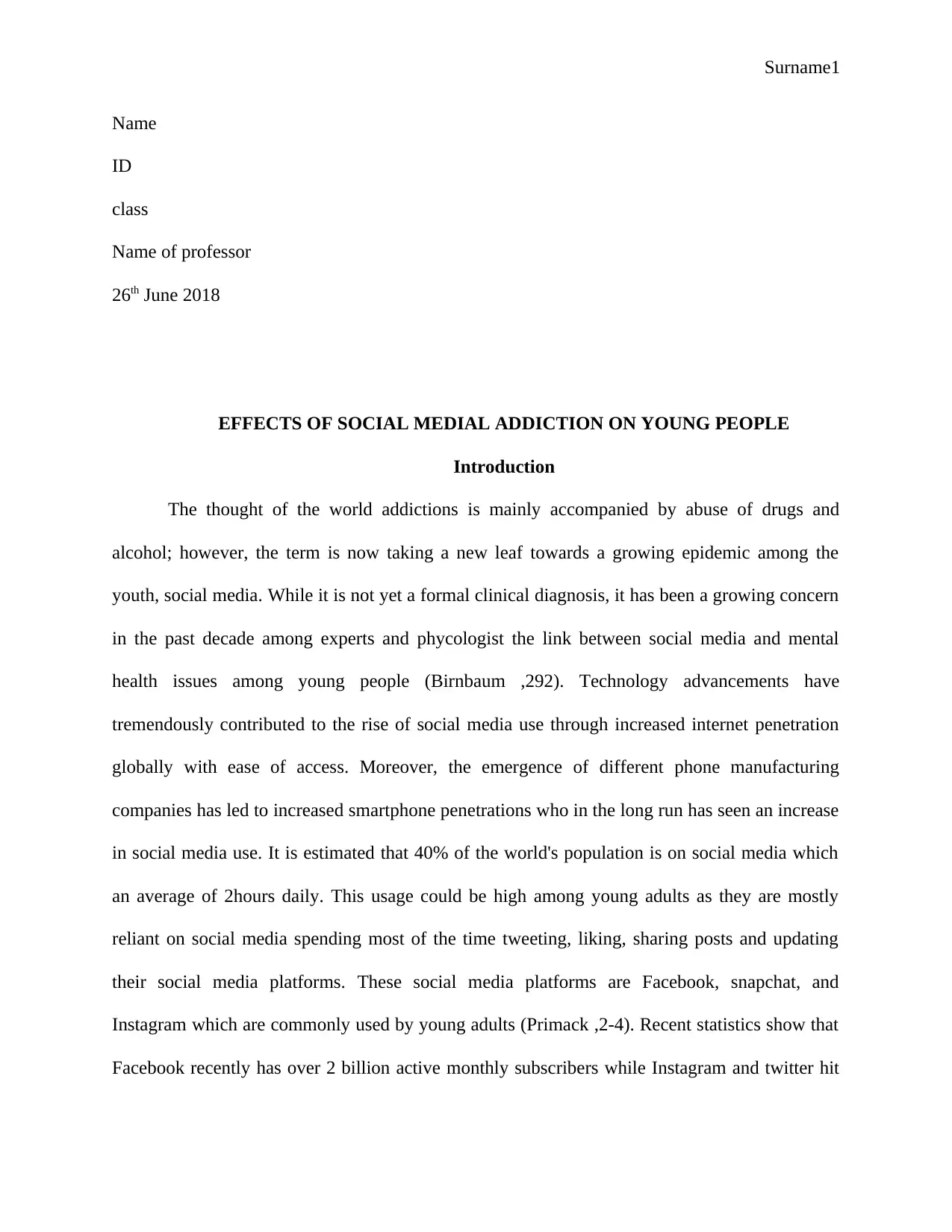
Surname1
Name
ID
class
Name of professor
26th June 2018
EFFECTS OF SOCIAL MEDIAL ADDICTION ON YOUNG PEOPLE
Introduction
The thought of the world addictions is mainly accompanied by abuse of drugs and
alcohol; however, the term is now taking a new leaf towards a growing epidemic among the
youth, social media. While it is not yet a formal clinical diagnosis, it has been a growing concern
in the past decade among experts and phycologist the link between social media and mental
health issues among young people (Birnbaum ,292). Technology advancements have
tremendously contributed to the rise of social media use through increased internet penetration
globally with ease of access. Moreover, the emergence of different phone manufacturing
companies has led to increased smartphone penetrations who in the long run has seen an increase
in social media use. It is estimated that 40% of the world's population is on social media which
an average of 2hours daily. This usage could be high among young adults as they are mostly
reliant on social media spending most of the time tweeting, liking, sharing posts and updating
their social media platforms. These social media platforms are Facebook, snapchat, and
Instagram which are commonly used by young adults (Primack ,2-4). Recent statistics show that
Facebook recently has over 2 billion active monthly subscribers while Instagram and twitter hit
Name
ID
class
Name of professor
26th June 2018
EFFECTS OF SOCIAL MEDIAL ADDICTION ON YOUNG PEOPLE
Introduction
The thought of the world addictions is mainly accompanied by abuse of drugs and
alcohol; however, the term is now taking a new leaf towards a growing epidemic among the
youth, social media. While it is not yet a formal clinical diagnosis, it has been a growing concern
in the past decade among experts and phycologist the link between social media and mental
health issues among young people (Birnbaum ,292). Technology advancements have
tremendously contributed to the rise of social media use through increased internet penetration
globally with ease of access. Moreover, the emergence of different phone manufacturing
companies has led to increased smartphone penetrations who in the long run has seen an increase
in social media use. It is estimated that 40% of the world's population is on social media which
an average of 2hours daily. This usage could be high among young adults as they are mostly
reliant on social media spending most of the time tweeting, liking, sharing posts and updating
their social media platforms. These social media platforms are Facebook, snapchat, and
Instagram which are commonly used by young adults (Primack ,2-4). Recent statistics show that
Facebook recently has over 2 billion active monthly subscribers while Instagram and twitter hit
Paraphrase This Document
Need a fresh take? Get an instant paraphrase of this document with our AI Paraphraser
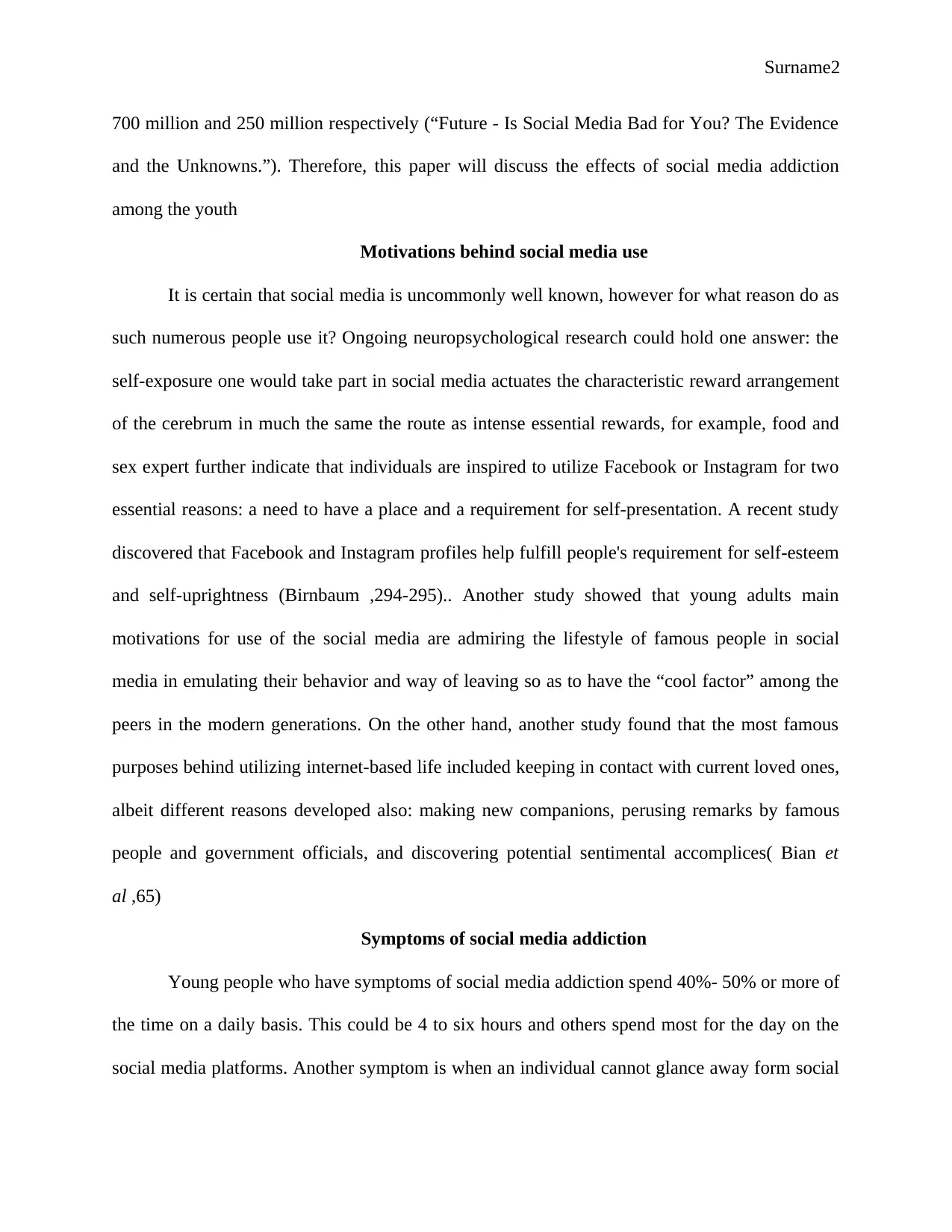
Surname2
700 million and 250 million respectively (“Future - Is Social Media Bad for You? The Evidence
and the Unknowns.”). Therefore, this paper will discuss the effects of social media addiction
among the youth
Motivations behind social media use
It is certain that social media is uncommonly well known, however for what reason do as
such numerous people use it? Ongoing neuropsychological research could hold one answer: the
self-exposure one would take part in social media actuates the characteristic reward arrangement
of the cerebrum in much the same the route as intense essential rewards, for example, food and
sex expert further indicate that individuals are inspired to utilize Facebook or Instagram for two
essential reasons: a need to have a place and a requirement for self-presentation. A recent study
discovered that Facebook and Instagram profiles help fulfill people's requirement for self-esteem
and self-uprightness (Birnbaum ,294-295).. Another study showed that young adults main
motivations for use of the social media are admiring the lifestyle of famous people in social
media in emulating their behavior and way of leaving so as to have the “cool factor” among the
peers in the modern generations. On the other hand, another study found that the most famous
purposes behind utilizing internet-based life included keeping in contact with current loved ones,
albeit different reasons developed also: making new companions, perusing remarks by famous
people and government officials, and discovering potential sentimental accomplices( Bian et
al ,65)
Symptoms of social media addiction
Young people who have symptoms of social media addiction spend 40%- 50% or more of
the time on a daily basis. This could be 4 to six hours and others spend most for the day on the
social media platforms. Another symptom is when an individual cannot glance away form social
700 million and 250 million respectively (“Future - Is Social Media Bad for You? The Evidence
and the Unknowns.”). Therefore, this paper will discuss the effects of social media addiction
among the youth
Motivations behind social media use
It is certain that social media is uncommonly well known, however for what reason do as
such numerous people use it? Ongoing neuropsychological research could hold one answer: the
self-exposure one would take part in social media actuates the characteristic reward arrangement
of the cerebrum in much the same the route as intense essential rewards, for example, food and
sex expert further indicate that individuals are inspired to utilize Facebook or Instagram for two
essential reasons: a need to have a place and a requirement for self-presentation. A recent study
discovered that Facebook and Instagram profiles help fulfill people's requirement for self-esteem
and self-uprightness (Birnbaum ,294-295).. Another study showed that young adults main
motivations for use of the social media are admiring the lifestyle of famous people in social
media in emulating their behavior and way of leaving so as to have the “cool factor” among the
peers in the modern generations. On the other hand, another study found that the most famous
purposes behind utilizing internet-based life included keeping in contact with current loved ones,
albeit different reasons developed also: making new companions, perusing remarks by famous
people and government officials, and discovering potential sentimental accomplices( Bian et
al ,65)
Symptoms of social media addiction
Young people who have symptoms of social media addiction spend 40%- 50% or more of
the time on a daily basis. This could be 4 to six hours and others spend most for the day on the
social media platforms. Another symptom is when an individual cannot glance away form social
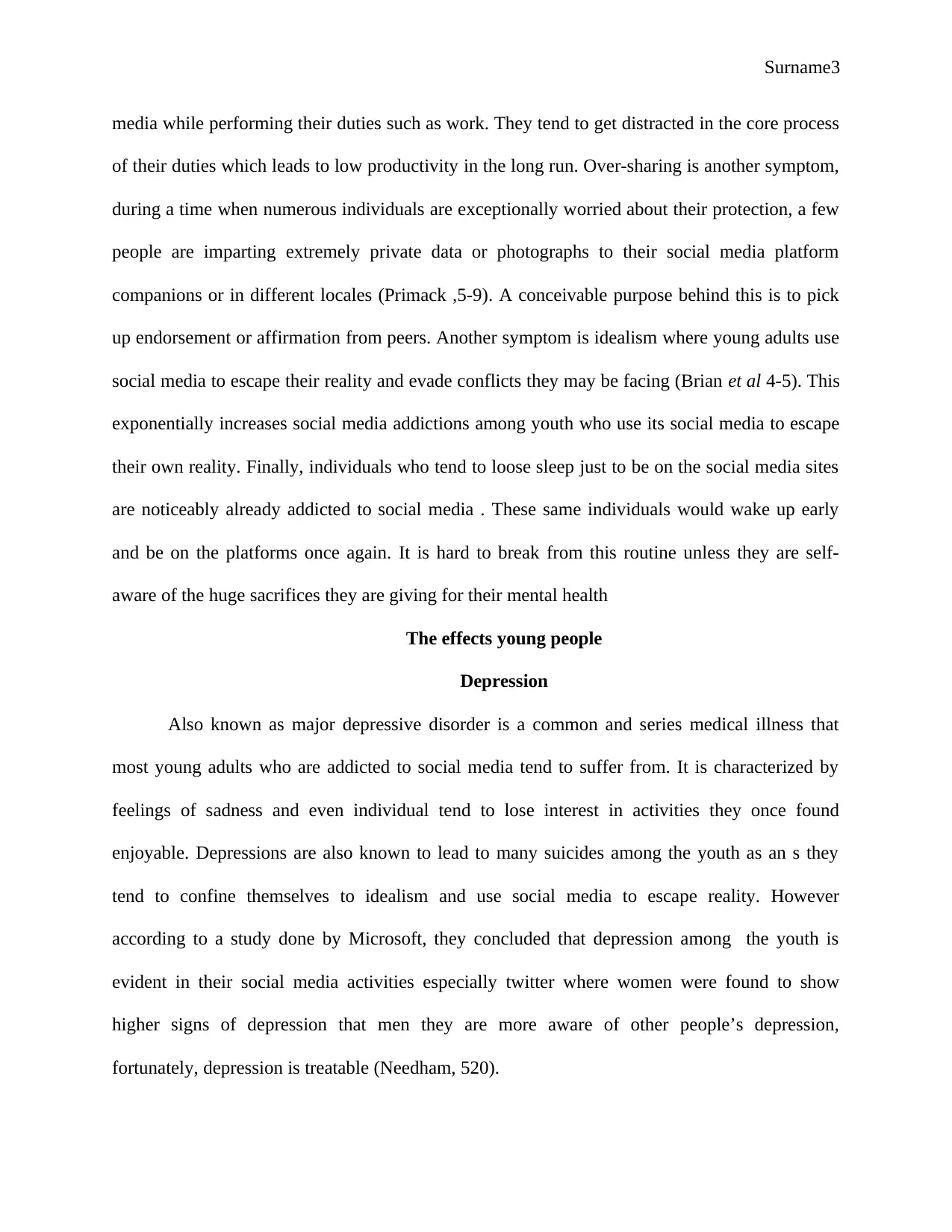
Surname3
media while performing their duties such as work. They tend to get distracted in the core process
of their duties which leads to low productivity in the long run. Over-sharing is another symptom,
during a time when numerous individuals are exceptionally worried about their protection, a few
people are imparting extremely private data or photographs to their social media platform
companions or in different locales (Primack ,5-9). A conceivable purpose behind this is to pick
up endorsement or affirmation from peers. Another symptom is idealism where young adults use
social media to escape their reality and evade conflicts they may be facing (Brian et al 4-5). This
exponentially increases social media addictions among youth who use its social media to escape
their own reality. Finally, individuals who tend to loose sleep just to be on the social media sites
are noticeably already addicted to social media . These same individuals would wake up early
and be on the platforms once again. It is hard to break from this routine unless they are self-
aware of the huge sacrifices they are giving for their mental health
The effects young people
Depression
Also known as major depressive disorder is a common and series medical illness that
most young adults who are addicted to social media tend to suffer from. It is characterized by
feelings of sadness and even individual tend to lose interest in activities they once found
enjoyable. Depressions are also known to lead to many suicides among the youth as an s they
tend to confine themselves to idealism and use social media to escape reality. However
according to a study done by Microsoft, they concluded that depression among the youth is
evident in their social media activities especially twitter where women were found to show
higher signs of depression that men they are more aware of other people’s depression,
fortunately, depression is treatable (Needham, 520).
media while performing their duties such as work. They tend to get distracted in the core process
of their duties which leads to low productivity in the long run. Over-sharing is another symptom,
during a time when numerous individuals are exceptionally worried about their protection, a few
people are imparting extremely private data or photographs to their social media platform
companions or in different locales (Primack ,5-9). A conceivable purpose behind this is to pick
up endorsement or affirmation from peers. Another symptom is idealism where young adults use
social media to escape their reality and evade conflicts they may be facing (Brian et al 4-5). This
exponentially increases social media addictions among youth who use its social media to escape
their own reality. Finally, individuals who tend to loose sleep just to be on the social media sites
are noticeably already addicted to social media . These same individuals would wake up early
and be on the platforms once again. It is hard to break from this routine unless they are self-
aware of the huge sacrifices they are giving for their mental health
The effects young people
Depression
Also known as major depressive disorder is a common and series medical illness that
most young adults who are addicted to social media tend to suffer from. It is characterized by
feelings of sadness and even individual tend to lose interest in activities they once found
enjoyable. Depressions are also known to lead to many suicides among the youth as an s they
tend to confine themselves to idealism and use social media to escape reality. However
according to a study done by Microsoft, they concluded that depression among the youth is
evident in their social media activities especially twitter where women were found to show
higher signs of depression that men they are more aware of other people’s depression,
fortunately, depression is treatable (Needham, 520).
⊘ This is a preview!⊘
Do you want full access?
Subscribe today to unlock all pages.

Trusted by 1+ million students worldwide
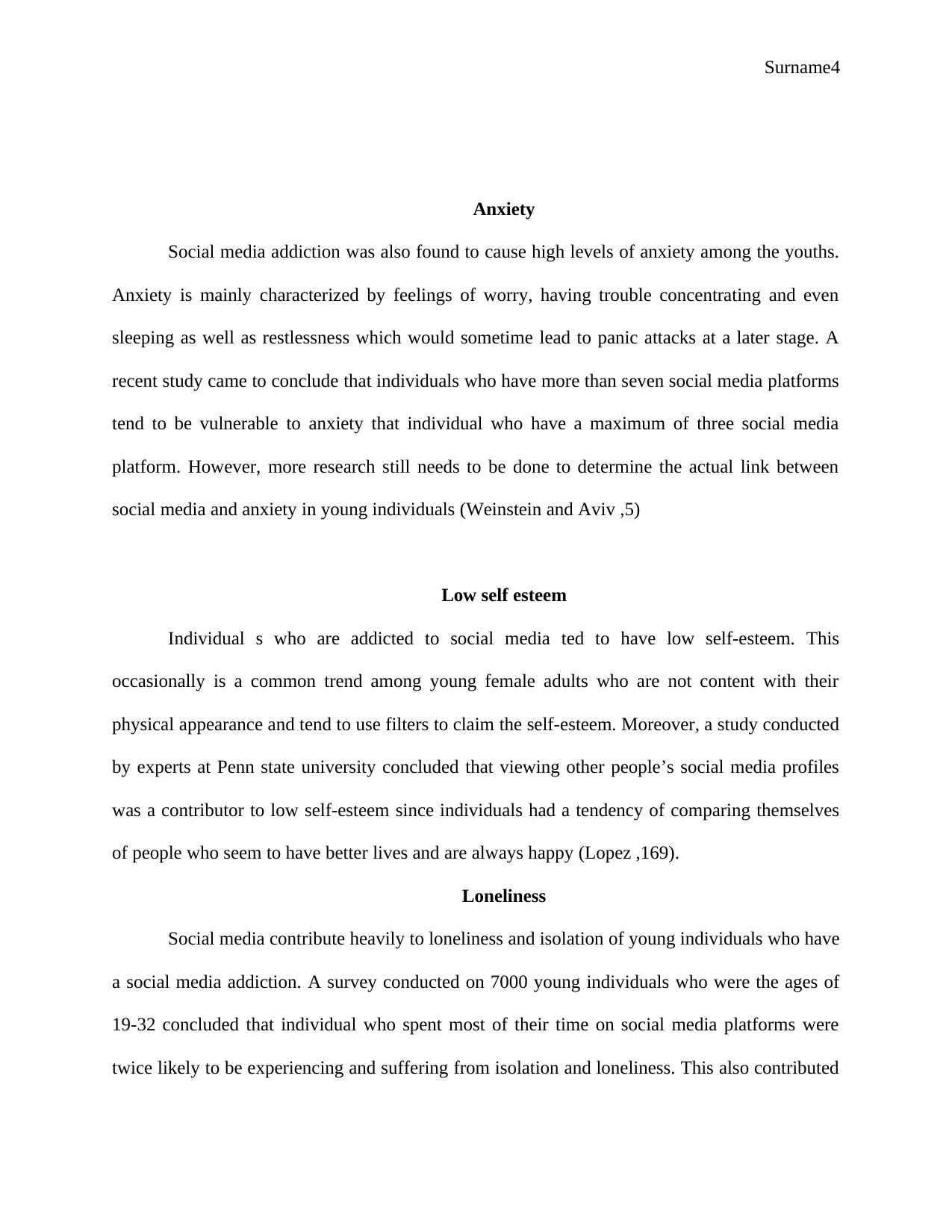
Surname4
Anxiety
Social media addiction was also found to cause high levels of anxiety among the youths.
Anxiety is mainly characterized by feelings of worry, having trouble concentrating and even
sleeping as well as restlessness which would sometime lead to panic attacks at a later stage. A
recent study came to conclude that individuals who have more than seven social media platforms
tend to be vulnerable to anxiety that individual who have a maximum of three social media
platform. However, more research still needs to be done to determine the actual link between
social media and anxiety in young individuals (Weinstein and Aviv ,5)
Low self esteem
Individual s who are addicted to social media ted to have low self-esteem. This
occasionally is a common trend among young female adults who are not content with their
physical appearance and tend to use filters to claim the self-esteem. Moreover, a study conducted
by experts at Penn state university concluded that viewing other people’s social media profiles
was a contributor to low self-esteem since individuals had a tendency of comparing themselves
of people who seem to have better lives and are always happy (Lopez ,169).
Loneliness
Social media contribute heavily to loneliness and isolation of young individuals who have
a social media addiction. A survey conducted on 7000 young individuals who were the ages of
19-32 concluded that individual who spent most of their time on social media platforms were
twice likely to be experiencing and suffering from isolation and loneliness. This also contributed
Anxiety
Social media addiction was also found to cause high levels of anxiety among the youths.
Anxiety is mainly characterized by feelings of worry, having trouble concentrating and even
sleeping as well as restlessness which would sometime lead to panic attacks at a later stage. A
recent study came to conclude that individuals who have more than seven social media platforms
tend to be vulnerable to anxiety that individual who have a maximum of three social media
platform. However, more research still needs to be done to determine the actual link between
social media and anxiety in young individuals (Weinstein and Aviv ,5)
Low self esteem
Individual s who are addicted to social media ted to have low self-esteem. This
occasionally is a common trend among young female adults who are not content with their
physical appearance and tend to use filters to claim the self-esteem. Moreover, a study conducted
by experts at Penn state university concluded that viewing other people’s social media profiles
was a contributor to low self-esteem since individuals had a tendency of comparing themselves
of people who seem to have better lives and are always happy (Lopez ,169).
Loneliness
Social media contribute heavily to loneliness and isolation of young individuals who have
a social media addiction. A survey conducted on 7000 young individuals who were the ages of
19-32 concluded that individual who spent most of their time on social media platforms were
twice likely to be experiencing and suffering from isolation and loneliness. This also contributed
Paraphrase This Document
Need a fresh take? Get an instant paraphrase of this document with our AI Paraphraser
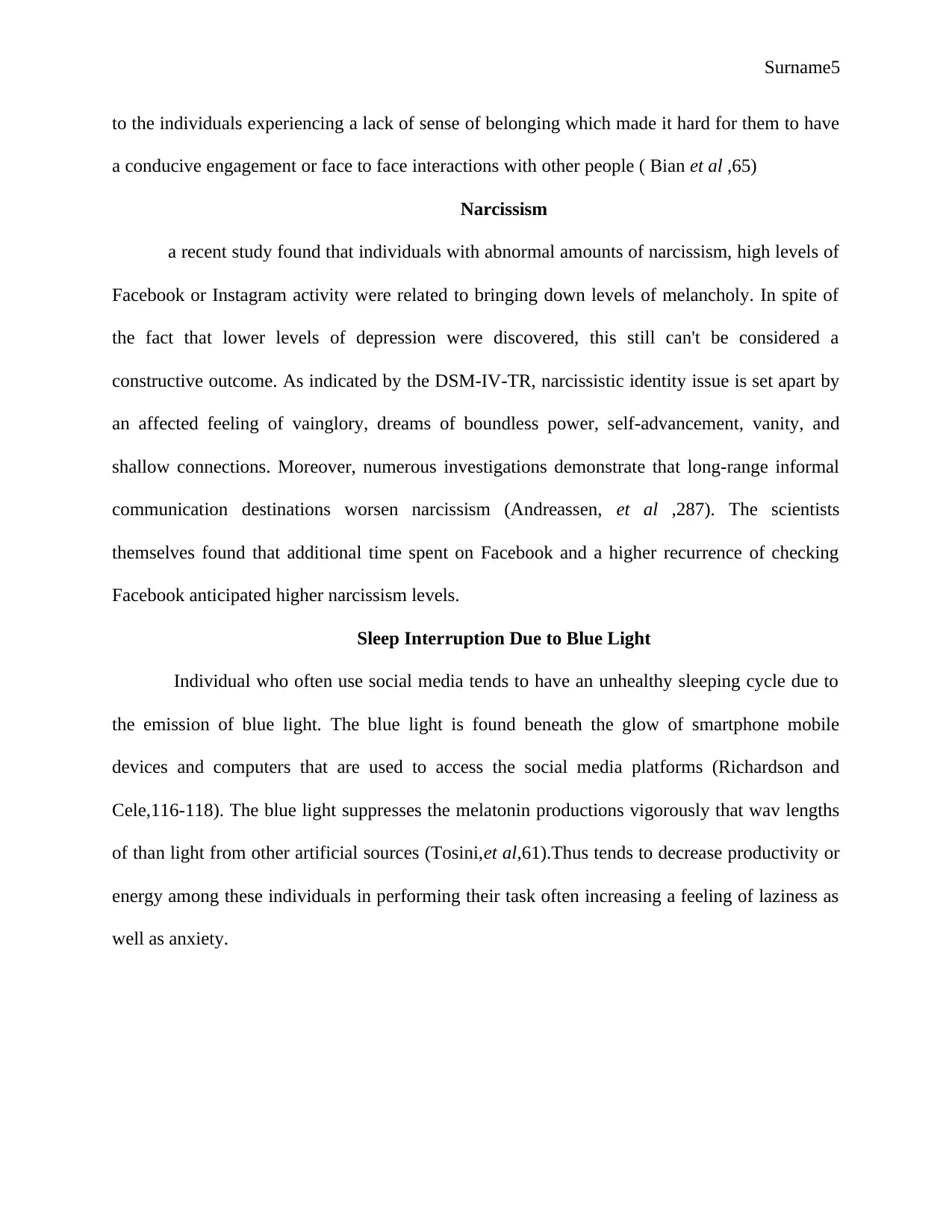
Surname5
to the individuals experiencing a lack of sense of belonging which made it hard for them to have
a conducive engagement or face to face interactions with other people ( Bian et al ,65)
Narcissism
a recent study found that individuals with abnormal amounts of narcissism, high levels of
Facebook or Instagram activity were related to bringing down levels of melancholy. In spite of
the fact that lower levels of depression were discovered, this still can't be considered a
constructive outcome. As indicated by the DSM-IV-TR, narcissistic identity issue is set apart by
an affected feeling of vainglory, dreams of boundless power, self-advancement, vanity, and
shallow connections. Moreover, numerous investigations demonstrate that long-range informal
communication destinations worsen narcissism (Andreassen, et al ,287). The scientists
themselves found that additional time spent on Facebook and a higher recurrence of checking
Facebook anticipated higher narcissism levels.
Sleep Interruption Due to Blue Light
Individual who often use social media tends to have an unhealthy sleeping cycle due to
the emission of blue light. The blue light is found beneath the glow of smartphone mobile
devices and computers that are used to access the social media platforms (Richardson and
Cele,116-118). The blue light suppresses the melatonin productions vigorously that wav lengths
of than light from other artificial sources (Tosini,et al,61).Thus tends to decrease productivity or
energy among these individuals in performing their task often increasing a feeling of laziness as
well as anxiety.
to the individuals experiencing a lack of sense of belonging which made it hard for them to have
a conducive engagement or face to face interactions with other people ( Bian et al ,65)
Narcissism
a recent study found that individuals with abnormal amounts of narcissism, high levels of
Facebook or Instagram activity were related to bringing down levels of melancholy. In spite of
the fact that lower levels of depression were discovered, this still can't be considered a
constructive outcome. As indicated by the DSM-IV-TR, narcissistic identity issue is set apart by
an affected feeling of vainglory, dreams of boundless power, self-advancement, vanity, and
shallow connections. Moreover, numerous investigations demonstrate that long-range informal
communication destinations worsen narcissism (Andreassen, et al ,287). The scientists
themselves found that additional time spent on Facebook and a higher recurrence of checking
Facebook anticipated higher narcissism levels.
Sleep Interruption Due to Blue Light
Individual who often use social media tends to have an unhealthy sleeping cycle due to
the emission of blue light. The blue light is found beneath the glow of smartphone mobile
devices and computers that are used to access the social media platforms (Richardson and
Cele,116-118). The blue light suppresses the melatonin productions vigorously that wav lengths
of than light from other artificial sources (Tosini,et al,61).Thus tends to decrease productivity or
energy among these individuals in performing their task often increasing a feeling of laziness as
well as anxiety.
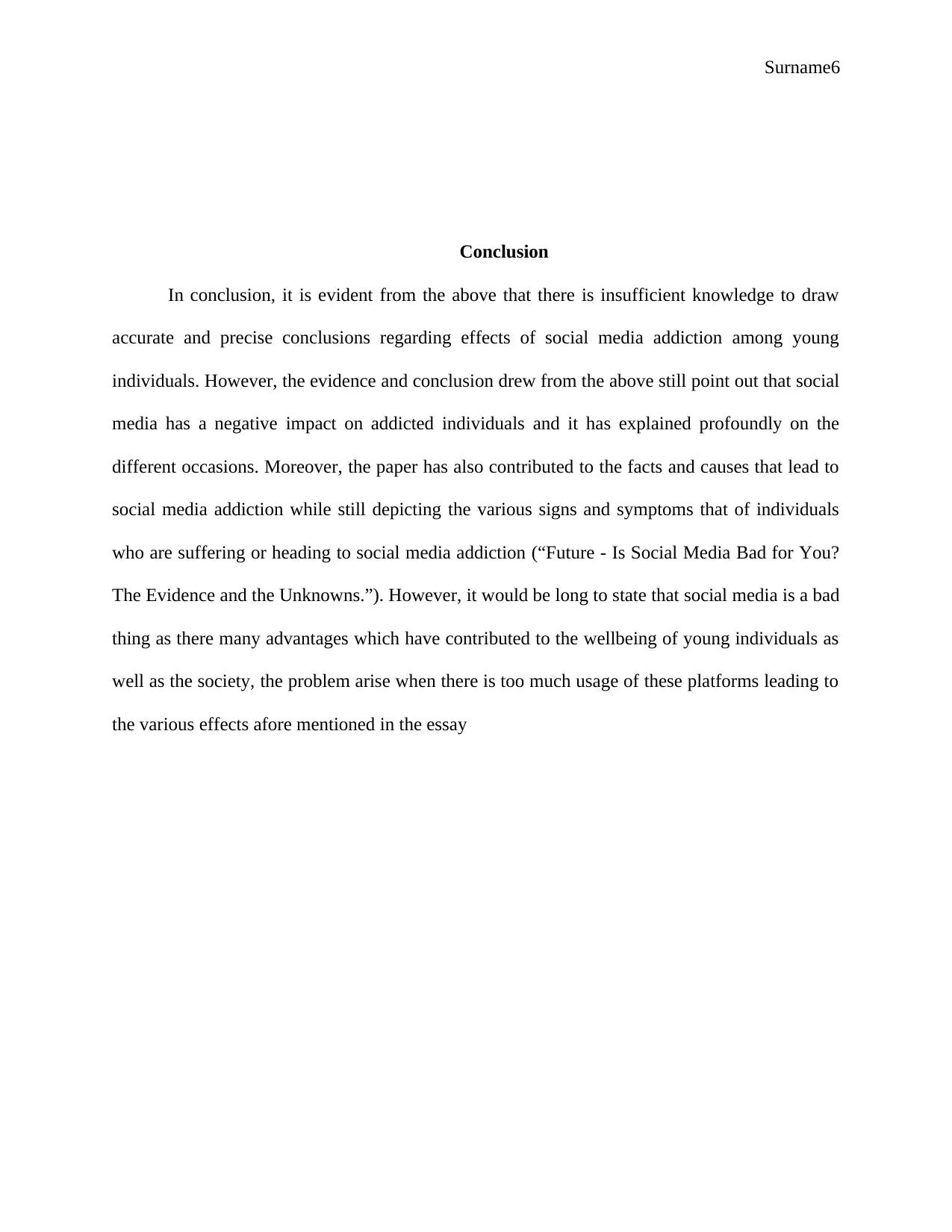
Surname6
Conclusion
In conclusion, it is evident from the above that there is insufficient knowledge to draw
accurate and precise conclusions regarding effects of social media addiction among young
individuals. However, the evidence and conclusion drew from the above still point out that social
media has a negative impact on addicted individuals and it has explained profoundly on the
different occasions. Moreover, the paper has also contributed to the facts and causes that lead to
social media addiction while still depicting the various signs and symptoms that of individuals
who are suffering or heading to social media addiction (“Future - Is Social Media Bad for You?
The Evidence and the Unknowns.”). However, it would be long to state that social media is a bad
thing as there many advantages which have contributed to the wellbeing of young individuals as
well as the society, the problem arise when there is too much usage of these platforms leading to
the various effects afore mentioned in the essay
Conclusion
In conclusion, it is evident from the above that there is insufficient knowledge to draw
accurate and precise conclusions regarding effects of social media addiction among young
individuals. However, the evidence and conclusion drew from the above still point out that social
media has a negative impact on addicted individuals and it has explained profoundly on the
different occasions. Moreover, the paper has also contributed to the facts and causes that lead to
social media addiction while still depicting the various signs and symptoms that of individuals
who are suffering or heading to social media addiction (“Future - Is Social Media Bad for You?
The Evidence and the Unknowns.”). However, it would be long to state that social media is a bad
thing as there many advantages which have contributed to the wellbeing of young individuals as
well as the society, the problem arise when there is too much usage of these platforms leading to
the various effects afore mentioned in the essay
⊘ This is a preview!⊘
Do you want full access?
Subscribe today to unlock all pages.

Trusted by 1+ million students worldwide
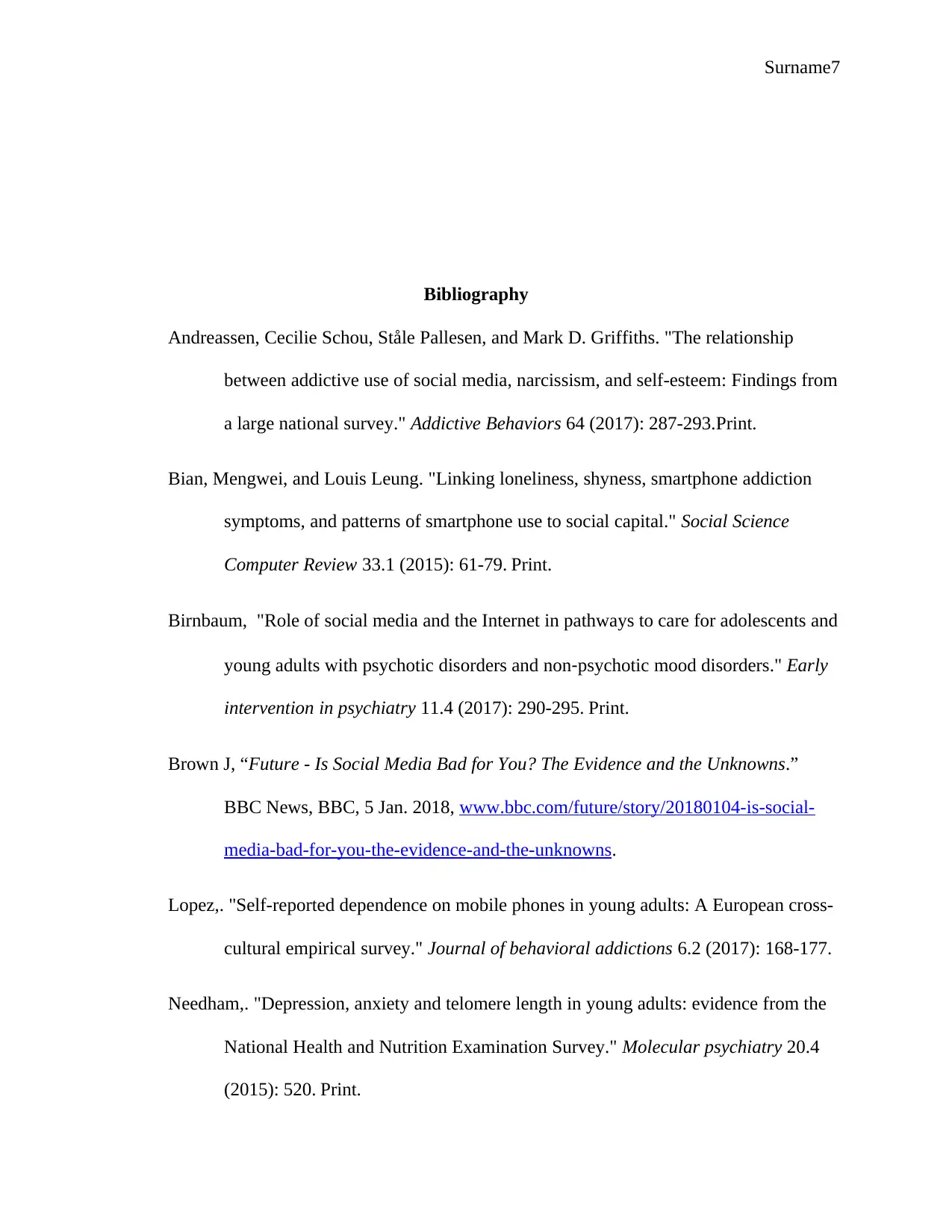
Surname7
Bibliography
Andreassen, Cecilie Schou, Ståle Pallesen, and Mark D. Griffiths. "The relationship
between addictive use of social media, narcissism, and self-esteem: Findings from
a large national survey." Addictive Behaviors 64 (2017): 287-293.Print.
Bian, Mengwei, and Louis Leung. "Linking loneliness, shyness, smartphone addiction
symptoms, and patterns of smartphone use to social capital." Social Science
Computer Review 33.1 (2015): 61-79. Print.
Birnbaum, "Role of social media and the Internet in pathways to care for adolescents and
young adults with psychotic disorders and non‐psychotic mood disorders." Early
intervention in psychiatry 11.4 (2017): 290-295. Print.
Brown J, “Future - Is Social Media Bad for You? The Evidence and the Unknowns.”
BBC News, BBC, 5 Jan. 2018, www.bbc.com/future/story/20180104-is-social-
media-bad-for-you-the-evidence-and-the-unknowns.
Lopez,. "Self-reported dependence on mobile phones in young adults: A European cross-
cultural empirical survey." Journal of behavioral addictions 6.2 (2017): 168-177.
Needham,. "Depression, anxiety and telomere length in young adults: evidence from the
National Health and Nutrition Examination Survey." Molecular psychiatry 20.4
(2015): 520. Print.
Bibliography
Andreassen, Cecilie Schou, Ståle Pallesen, and Mark D. Griffiths. "The relationship
between addictive use of social media, narcissism, and self-esteem: Findings from
a large national survey." Addictive Behaviors 64 (2017): 287-293.Print.
Bian, Mengwei, and Louis Leung. "Linking loneliness, shyness, smartphone addiction
symptoms, and patterns of smartphone use to social capital." Social Science
Computer Review 33.1 (2015): 61-79. Print.
Birnbaum, "Role of social media and the Internet in pathways to care for adolescents and
young adults with psychotic disorders and non‐psychotic mood disorders." Early
intervention in psychiatry 11.4 (2017): 290-295. Print.
Brown J, “Future - Is Social Media Bad for You? The Evidence and the Unknowns.”
BBC News, BBC, 5 Jan. 2018, www.bbc.com/future/story/20180104-is-social-
media-bad-for-you-the-evidence-and-the-unknowns.
Lopez,. "Self-reported dependence on mobile phones in young adults: A European cross-
cultural empirical survey." Journal of behavioral addictions 6.2 (2017): 168-177.
Needham,. "Depression, anxiety and telomere length in young adults: evidence from the
National Health and Nutrition Examination Survey." Molecular psychiatry 20.4
(2015): 520. Print.
Paraphrase This Document
Need a fresh take? Get an instant paraphrase of this document with our AI Paraphraser
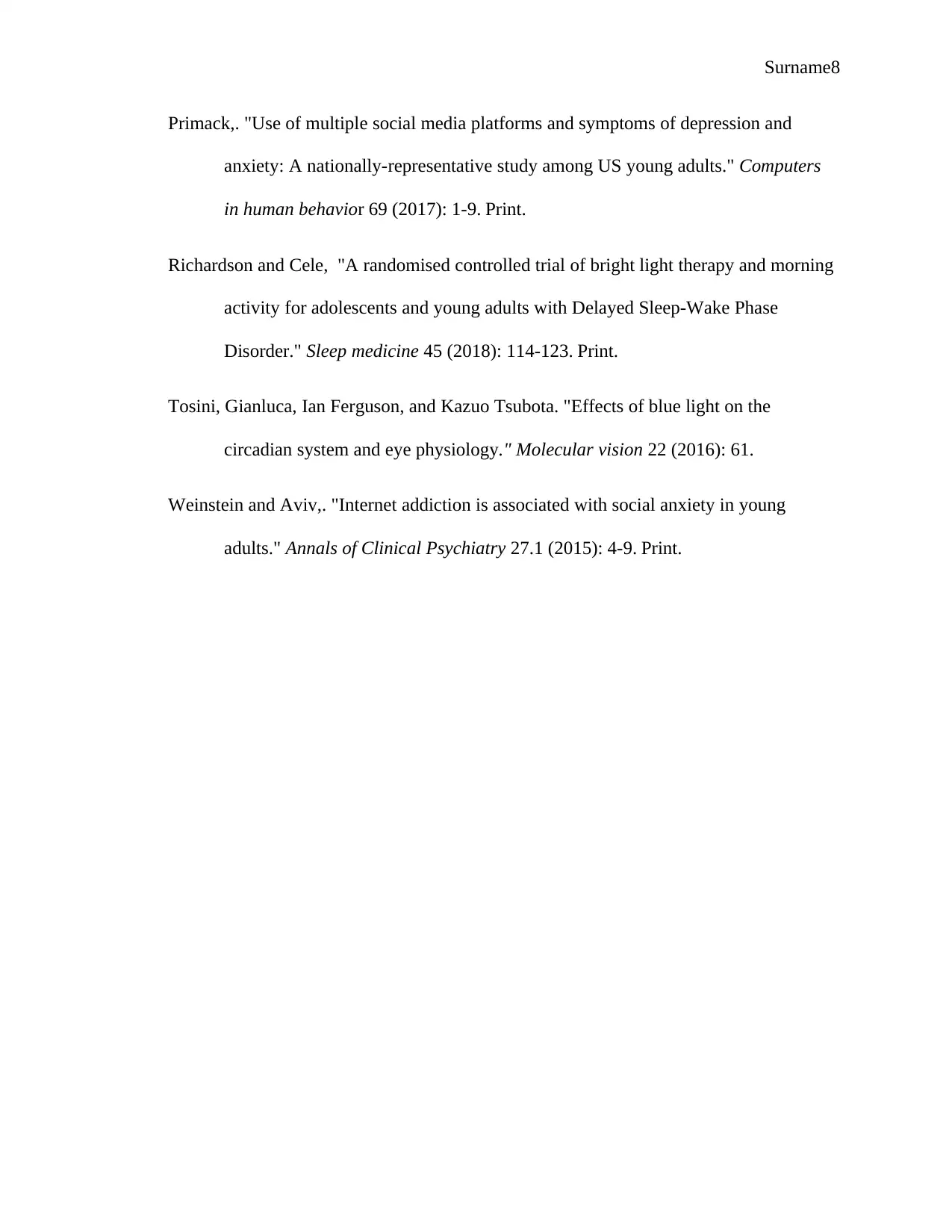
Surname8
Primack,. "Use of multiple social media platforms and symptoms of depression and
anxiety: A nationally-representative study among US young adults." Computers
in human behavior 69 (2017): 1-9. Print.
Richardson and Cele, "A randomised controlled trial of bright light therapy and morning
activity for adolescents and young adults with Delayed Sleep-Wake Phase
Disorder." Sleep medicine 45 (2018): 114-123. Print.
Tosini, Gianluca, Ian Ferguson, and Kazuo Tsubota. "Effects of blue light on the
circadian system and eye physiology." Molecular vision 22 (2016): 61.
Weinstein and Aviv,. "Internet addiction is associated with social anxiety in young
adults." Annals of Clinical Psychiatry 27.1 (2015): 4-9. Print.
Primack,. "Use of multiple social media platforms and symptoms of depression and
anxiety: A nationally-representative study among US young adults." Computers
in human behavior 69 (2017): 1-9. Print.
Richardson and Cele, "A randomised controlled trial of bright light therapy and morning
activity for adolescents and young adults with Delayed Sleep-Wake Phase
Disorder." Sleep medicine 45 (2018): 114-123. Print.
Tosini, Gianluca, Ian Ferguson, and Kazuo Tsubota. "Effects of blue light on the
circadian system and eye physiology." Molecular vision 22 (2016): 61.
Weinstein and Aviv,. "Internet addiction is associated with social anxiety in young
adults." Annals of Clinical Psychiatry 27.1 (2015): 4-9. Print.
1 out of 8
Related Documents
Your All-in-One AI-Powered Toolkit for Academic Success.
+13062052269
info@desklib.com
Available 24*7 on WhatsApp / Email
![[object Object]](/_next/static/media/star-bottom.7253800d.svg)
Unlock your academic potential
Copyright © 2020–2025 A2Z Services. All Rights Reserved. Developed and managed by ZUCOL.





